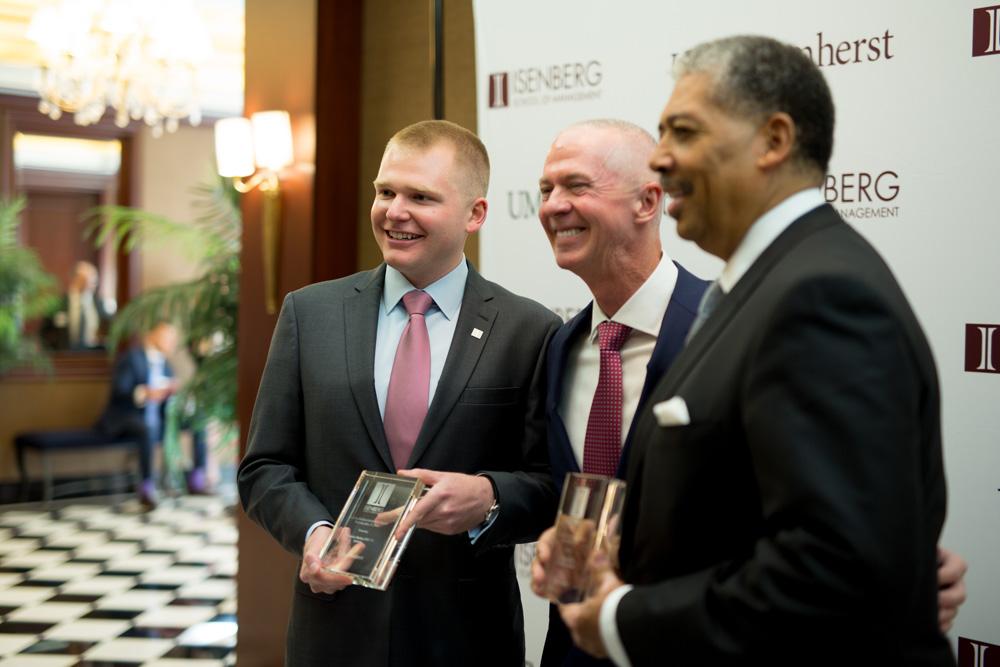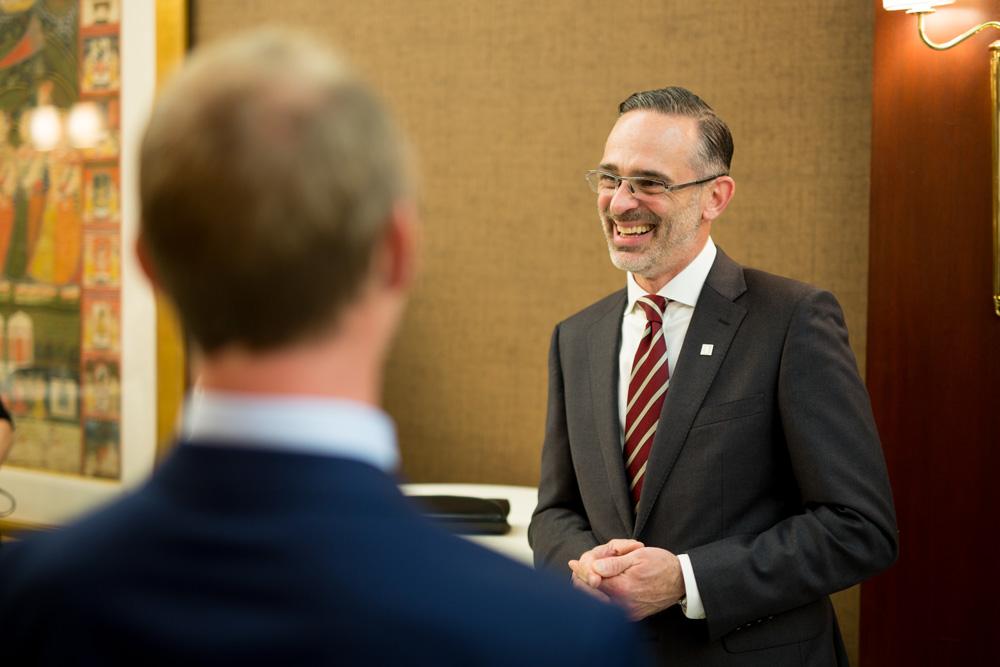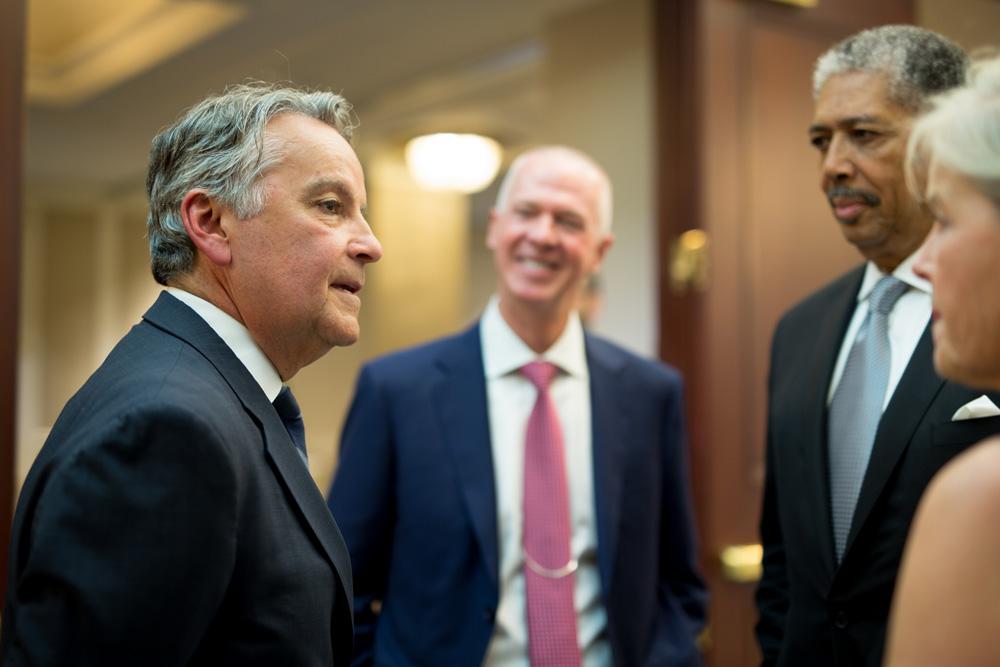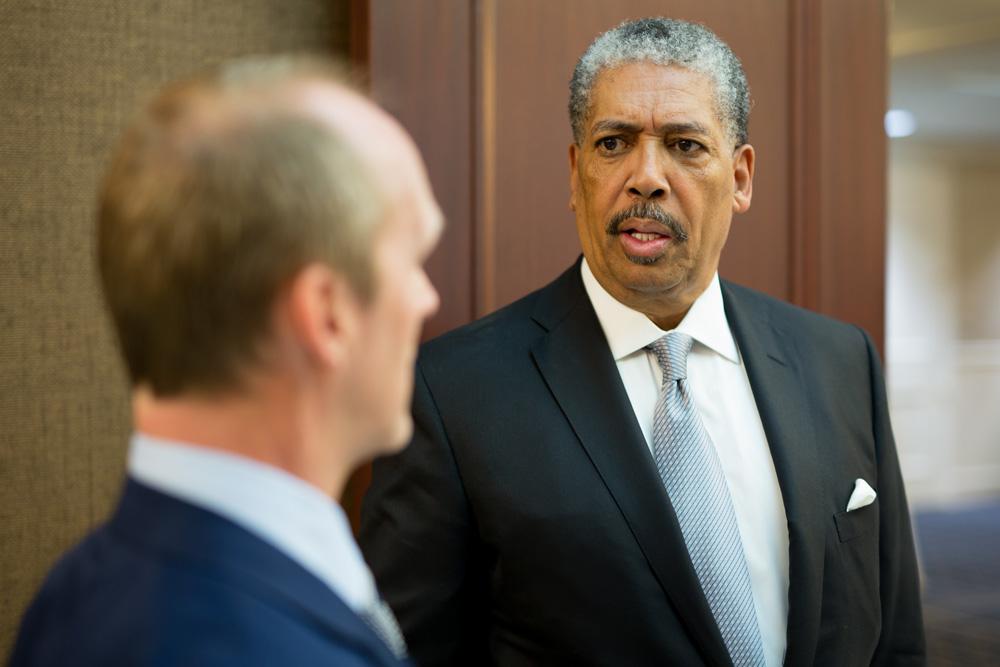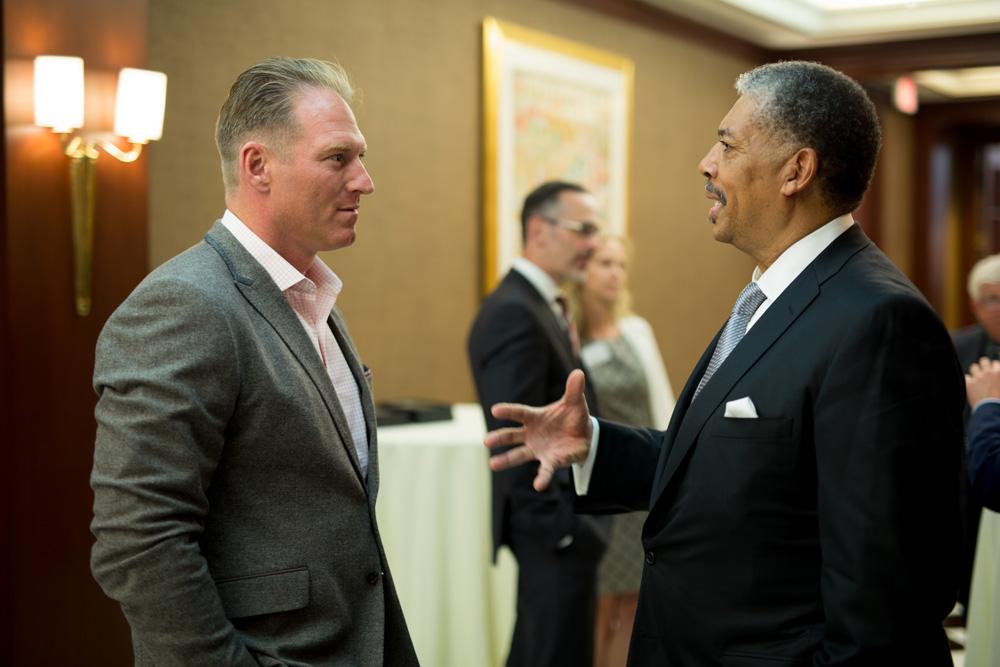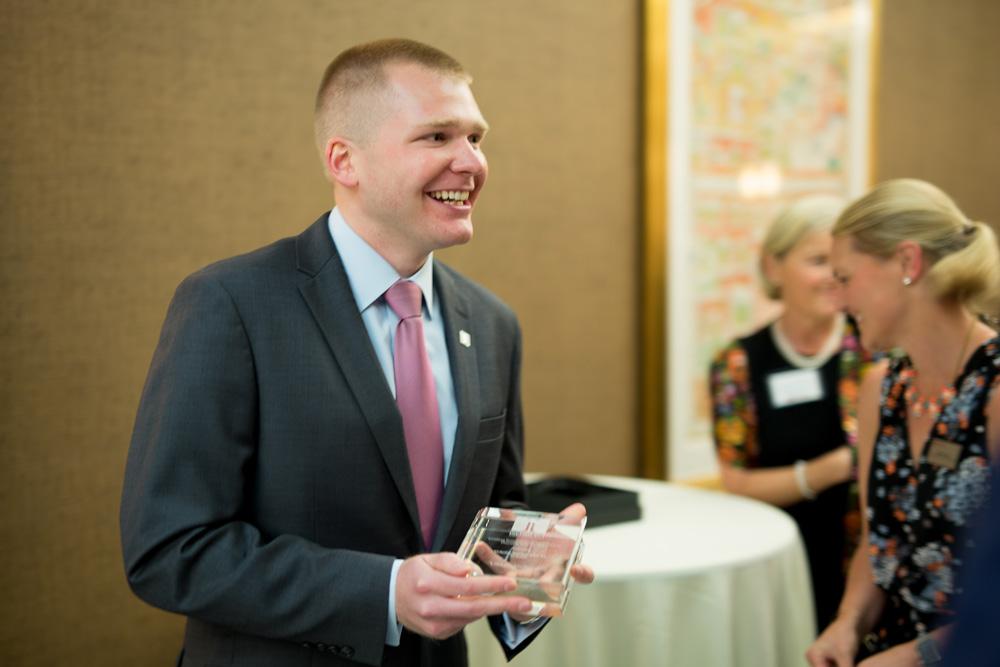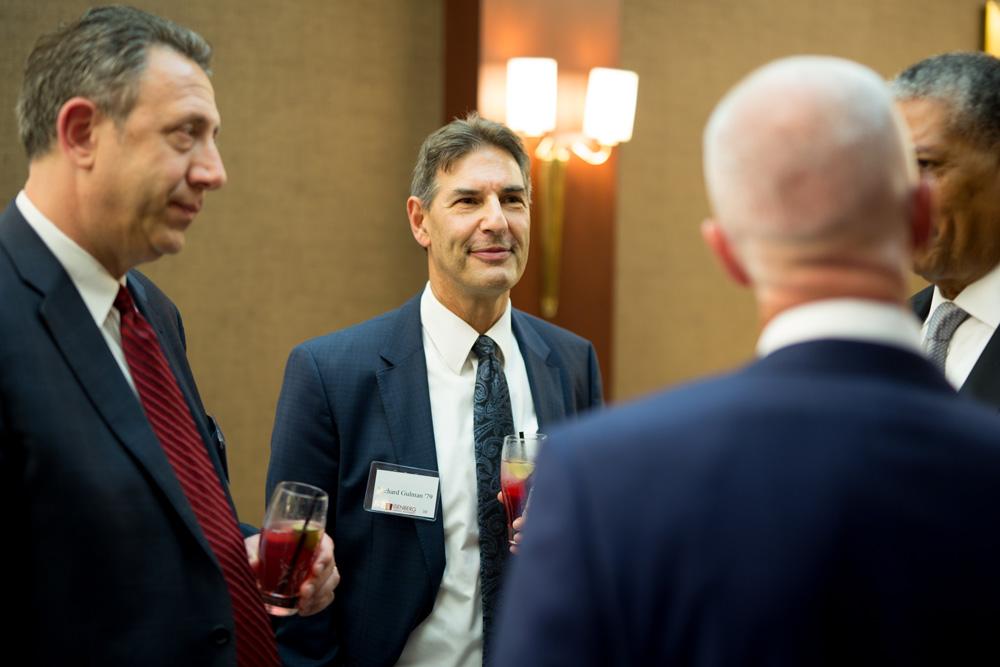Annual Isenberg Gathering Is a Multi-Generational Celebration
June 22, 2017
“Business leadership is critical. As a management major at Isenberg I learned about balancing economic growth with social responsibility,” emphasized Earl Stafford ’76 at Isenberg’s Business Leadership Awards (IBLA) dinner on June 15. Stafford was Principal Honoree at the annual event, which attracted 340 Isenberg stalwarts to Boston’s Colonnade Hotel. “Isenberg taught me business practices and techniques. Professors like Tony Butterfield and Art Elkins taught me the importance of value-based decisions—decisions that also promote the common good,” he told the gathering.
For four decades, Stafford’s career has exemplified those virtues. In 2002, he founded the faith-based Stafford Foundation, which promotes self-reliance through opportunities that engage socially and economically distressed populations in community service. Earl is also CEO of The Wentworth Group in Reston, Virginia, which invests in and provides business services to technology-focused small businesses. In an earlier incarnation, he was Chairman and CEO of UNITECH, a training and simulation technology company that served military and national security markets.
Earl is also a strong supporter of Isenberg’s Berthiaume Center for Entrepreneurship. And he energizes social entrepreneurship on campus through the Earl W. Stafford Professorship in Entrepreneurial Studies, currently held by Isenberg’s Vice Dean Tom Moliterno. Isenberg and Earl’s present-day commitment to business and social responsibility mirrors the values that resonated with him as a student. “Isenberg not only teaches that balance; it practices it,” he told his audience.
Isenberg: Aspirations and Strategy
Earlier in the program, Dean Mark Fuller shared aspirations for Isenberg with his enthusiastic, multigenerational audience. “During the period on the graph that you see, we were not merely among the best advancing business schools in the nation; we were the best business school,” he emphasized.
“We have a strategy—it’s student-centered and it works. We pay a lot of attention to human capital. We focus on the right metrics and we are obsessed with getting students jobs—good jobs. We have over a 92% placement rate in all seven majors,” he underscored.
“Our target,” Fuller continued, “is to be a top five public business school. To compete, though, we have to raise our game by bringing in philanthropic support from every generation.” The point, he remarked, is to increase all aspects of engagement by alumni, including their financial support for Isenberg, their role in bring opportunities to students and graduates, and their participation in the school and its future.
“Gene Isenberg used to say that education is the partial solution to any problem,” Fuller recalled. “This is Massachusetts—the best education state in the nation. Are you telling me that we can’t compete? We have the strategy. I encourage you to help us build one of the nation’s iconic business schools.”
Four Years out and Making a Difference
“I believe in Isenberg and its positive impact in cultivating and inspiring leadership,”“I believe in Isenberg and its positive impact in cultivating and inspiring leadership,” Recent Alumni Awardee Nick Markey ’13 told the gathering. A senior auditor with Deloitte in Boston, Nick periodically visits Amherst in his leadership roles with Deloitte’s UMass Alumni Committee and Isenberg’s Accounting Alumni Council. In the latter, he works with Isenberg’s accounting department to ensure the real-world relevance of its curriculum..
We know what drives the driven, but “what drives the drive?” Nick asked the audience. His answer: “It’s alumni support.” Witness the Class of 2017’s remarkable 65+% participation in its class gift, he observed. It’s easy for young alums to do positive things for Isenberg, Nick added, addressing his own “demographic.” Their contributions to the school, he noted, needn’t be financial. Young alums can make a difference, for example, by furthering opportunities for Isenberg students and graduates at their firms and by sharing professional and industry insights during visits to Isenberg.
With that said, Nick has created the Markey Family Minuteman Scholarship Endowment Fund, which will offer scholarships to veterans and undergraduates in active military duty at Isenberg. The bottom line, he emphasized, is that Isenberg alumni can significantly help move the school forward. “Our strength is in our numbers,” he insisted.
Isenberg’s Progress
2015 IBLA Principal Honoree Denise Coll ’75 introduced the evening’s program and charted Isenberg’s recent progress. “Over the past 12 months, the school’s momentum has been nothing short of spectacular,” remarked Denise, who excelled for eight years as president of Starwood Hotels and Resorts Worldwide. The year’s highlights, she noted, included groundbreaking ceremonies for Isenberg’s $65 million Business Innovation Hub, the school’s Online MBA program’s #1 ranking (#3 in the world) by The Financial Times, and Isenberg’s growing impact in Boston.
That expanding footprint, she continued, was evident in more than 20 Isenberg-hosted events in Boston and New York—including the high-profile Driven series at the UMass Club in Boston. (Apple cofounder Steve Wozniak and ZipCar founder Robin Chase were Driven’s first two headliners.) Isenberg, added Coll, has upped its visibility via cable TV, a partnership with WBUR, and strategic signage on the Red and Orange Lines and Back Bay Station.
Besides the evening’s principal honorees, Denise acknowledged Chancellor Kumble Subbaswamy and Colonnade Hotel Managing Director David Colella ’75.
A Multigenerational Identity
Last year’s Principal Honorees, Chuck and Karen Peters, introduced Earl Stafford. Last year’s Recent Alumni Honoree, Brian Tino ’11, introduced Nick Markey. The dual awards to younger and established alumni mirrored the event’s strong multigenerational attendance. Graduates from every decade from the 1950s on were in vivid, energetic evidence. So was retired accounting professor Richard Simpson, who elicited strong agreement from former acting dean Tony Butterfield with the following declaration: “When I meet alumni from the 1950s, 60s, and 70s, they identify with Isenberg, not the School of Management or the School of Business. They and every generation of our graduates—We are all Isenberg!”
